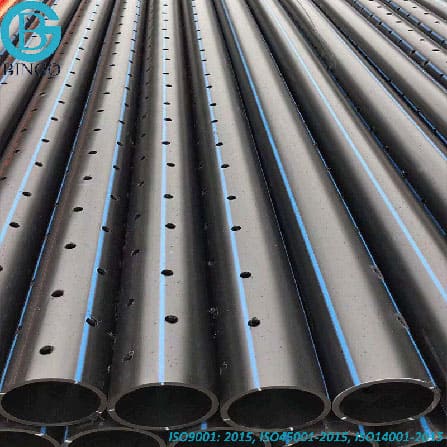Pipe Manufacturing Midland TX: Behind the Scenes
Wiki Article
Understanding the Key Benefits of HDPE Pipeline for Water and Wastewater Administration
Making use of HDPE pipeline in water and wastewater administration provides various advantages that merit consideration. Its phenomenal resilience and long life expectancy make it a recommended option for many projects. In addition, the product's resistance to corrosion and chemical damages boosts its integrity in various settings. The benefits extend past simply longevity and resistance. Pipe Manufacturing Midland TX. Exploring its cost-effectiveness and environmental impact exposes also more compelling reasons for its extensive adoption in modern infrastructureRemarkable Toughness and Longevity

HDPE pipe stands out for its remarkable resilience and long life, making it a preferred choice in water administration systems. Built from high-density polyethylene, these pipes can stand up to considerable pressure and tension, ensuring reputable performance in time. Their robust nature allows them to sustain severe ecological conditions, consisting of temperature level variations and dirt activities, which can create various other products to fail.
The lifespan of HDPE pipelines often goes beyond half a century, supplying an affordable service for communities and markets alike. Additionally, the material's light-weight residential properties streamline setup, decreasing labor prices and durations. This durability decreases the demand for regular repair work or substitutes, additionally enhancing its economic allure.
In water administration applications, the reliability of HDPE pipelines indicates fewer disruptions and improved service connection, making them indispensable to sustainable facilities growth. The mix of longevity and durability solidifies HDPE's function as a cornerstone in reliable water administration remedies.

Resistance to Rust and Chemical Damages
While several materials catch corrosion and chemical damage gradually, HDPE pipelines exhibit amazing resistance, making them perfect for different water monitoring applications. This strength stems from the molecular structure of high-density polyethylene, which is inherently non-reactive and does not rust like steels or deteriorate from direct exposure to rough chemicals. Therefore, HDPE is highly effective in atmospheres with aggressive compounds, such as wastewater systems that might include acids, bases, and natural solvents.
In addition, HDPE pipelines can stand up to environmental aspects such as soil acidity and saline conditions, even more improving their suitability for diverse applications (Pipe Supplier American Plastics Midland). Their capacity to preserve architectural stability in time decreases the risk of leaks and failures, which is critical in guaranteeing the safety and dependability of water distribution and wastewater management systems. The resistance to deterioration and chemical damages substantially adds to the general performance and long life of HDPE piping options.
Cost-Effectiveness and Economic Benefits
When taking into consideration the economic implications of water management systems, the cost-effectiveness of HDPE pipelines becomes evident. These pipes supply reduced installation and upkeep costs contrasted to traditional products like steel or concrete. Their light-weight nature simplifies transport and installation, leading to reduced labor expenditures. Furthermore, HDPE pipes display a lengthy lifespan, typically exceeding 50 years, which converts to fewer replacements and lasting savings.In addition, the resistance of HDPE to corrosion and chemical damages minimizes the requirement for pricey repair services and replacements. The pipes likewise sustain efficient water flow, reducing energy expenses linked with pumping systems. By mitigating leaks and water loss, HDPE pipelines add to significant economic benefits for communities and sectors alike. Overall, the initial financial investment in HDPE piping can generate significant financial returns over the lifespan of the water management system, making it a prudent option for lasting framework advancement.
Ecological Sustainability and Minimized Influence

Convenience and Flexibility in Installment
Since of their unique buildings, HDPE pipes offer exceptional flexibility and flexibility in installment, making them suitable for a variety of applications. Their lightweight nature enables easier handling and transport, decreasing labor expenses and setup time. HDPE pipelines can be curved and shaped to fit different surfaces and task demands, which is specifically beneficial in testing environments.Furthermore, their resistance to deterioration and chemical damage enables setup in diverse setups without the demand for specialized safety coverings. The capacity to fuse joints develops a continuous, leak-free system, improving the general honesty and reliability of the setup. HDPE's versatility likewise suits ground movement, decreasing the danger of damages in locations vulnerable to changing soil. Overall, these qualities make HDPE pipes not just versatile but likewise a favored choice for water and wastewater administration systems.
Often Asked Inquiries
How Does HDPE Pipeline Contrast to PVC in Water Monitoring Applications?
HDPE pipeline supplies premium flexibility, resistance to deterioration, and sturdiness compared to check here PVC. Its lighter weight assists in less complicated installment, while its lengthy life expectancy minimizes replacement costs, making HDPE a recommended selection in water monitoring applications.What Is the Life Expectancy of HDPE Water Lines Under Normal Conditions?
Under common conditions, HDPE pipelines can have a life-span varying from 50 to 100 years. Their toughness and resistance to deterioration add to their long-lasting performance in numerous applications, making them a dependable choice for framework.Are HDPE Piping Recyclable After Their Service Life?
Yes, HDPE pipes are recyclable after their life span. American Plastics HDPE Pipe for Oilfield. They can be processed and repurposed into brand-new items, considerably minimizing environmental effect and advertising sustainability within the industry, making them an eco-friendly choice for piping optionsWhat Is the Setup Refine for HDPE Pipeline?
The installment process for HDPE pipelines entails site prep work, trenching, pipeline combination or mechanical joining, backfilling, and pressure screening. Appropriate strategies guarantee a durable and effective system for delivering water and wastewater efficiently.Can HDPE Piping Be Used for Both Drinkable and Non-Potable Water Solutions?
Yes, HDPE pipelines can be used for both potable and non-potable water systems. Their convenience, sturdiness, and resistance to deterioration make them suitable for numerous applications, making certain secure and efficient transport of water in different contexts.Report this wiki page